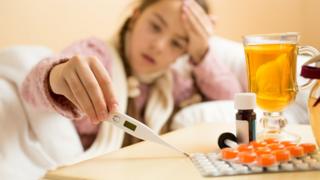Scottish teenage girls more sick and stressed says WHO report
- 15 March 2016
- From the section Scotland
 Image copyright
Thinkstock
Image copyright
Thinkstock
Fifteen-year-old girls in Scotland face more pressure from schoolwork and report poorer health than others around the globe, according to research.
The major study by the World Health Organisation (WHO) compared the health of children in 42 European and North American countries.
The research suggested Scotland had a significantly greater proportion of 15-year-old girls in poor health.
The Scottish government said income equality was at the root of the issue.
The WHO analysis of the health of 11-15 year olds suggested that, while 11-year-old Scottish children have healthier habits than children in many other countries, there is a marked decline by the time they reach 15.
The Health Behaviour in School-aged Children (HBSC) study has been carried out in 42 countries every 4 years for the last 30 years and provides a valuable indication of the wellbeing of the next generation of adults.
The latest survey suggested that Scotland has a significantly greater proportion of 15-year-old girls in poor health.
Teenagers were asked to pick from a list of symptoms which included headaches, nervousness, stomach ache and sleeping problems. The health of girls in low-income households was particularly bad.
The proportion of 15-year-olds reporting "some" or "a lot" of schoolwork pressure has also been increasing since 2006, with girls reporting a lot more pressure than boys.
However, 11-year-old Scottish schoolchildren fare much better. They have healthier habits than children in many other countries, including eating breakfast every day, teeth brushing and spending time with friends outside school.
Dr Joanna Inchley, deputy director of the Child and Adolescent Health Research Unit, based at the University of St Andrews, said: "It is encouraging that 11-year-olds in Scotland are doing well compared with many of their European counterparts, but we see a clear worsening of health and wellbeing during the adolescent years.
"Particularly concerning is the increase in school-related stress which may be contributing to poorer mental wellbeing especially among 15-year-old girls. It is essential that we look at ways of providing support to young people to help them navigate the challenges they face during adolescence."
Declining drunkenness
A positive finding was that the level of reported alcohol consumption among Scottish 15-year-olds continued to fall.
Dr Fergus Neville, a research fellow at the University of St Andrews, told Good Morning Scotland: "This is a good news story.
"I think there's a perception that alcohol is becoming an every increasing problem for our young people but since 1998 every time we've done the survey, every four years, we've seen a steady decrease in the proportion of 15-year-olds who've reported to have been drunk two or more times in their lifetime.
"The problem isn't solved however. We still have one of the highest proportions of 15-year-olds who say they've been drunk - about a third - so there's still some work to be done."
The report revealed that the gap between the health of the richest and poorest children was having an impact. It was widest among boys in all the 42 countries studied.
Scottish Health Improvement Minister Jamie Hepburn said: "We recognise that there are deeply ingrained health inequalities in Scotland - something which has existed for generations and which will not be solved overnight.
"At its root this is an issue of income inequality - and we need a shift in emphasis from dealing with the consequences to tackling the underlying causes, such as ending poverty, fair wages, supporting families and improving our physical and social environments.
"The Scottish government is already doing as much as we can.... However, we want to do more and will use the new powers coming to Scotland to help create a fairer and more equal society."
Gerry McCartney, head of the public health observatory at NHS Health Scotland said the study allowed the examination of the factors that lead young people to be healthy or unhealthy.
"The report highlights the progress we have made in many aspects of health amongst young people in Scotland over time, such as the decrease in consumption of high sugar drinks, but it also highlights the stark inequalities in how healthy children feel themselves to be," he said.
